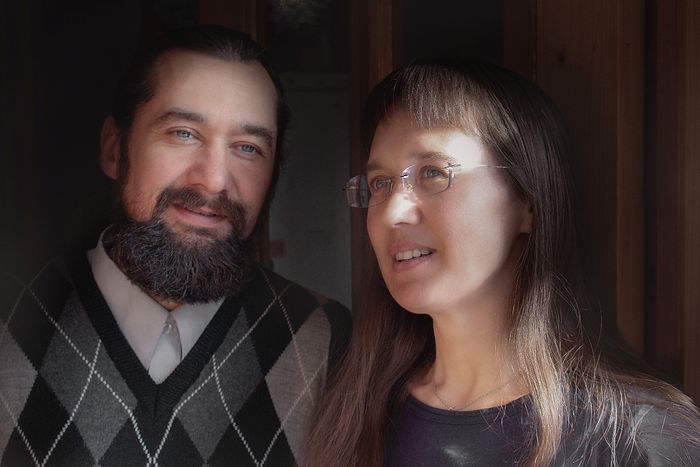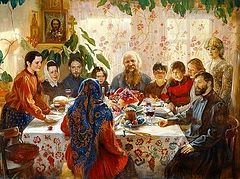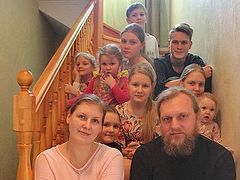Eleven children are growing up in the Kim family. At the beginning of their married life, Fr. Alexei and Irina Kim moved from the city to the country, looked after the house and raised their children without helpers. A series of different trials befell them, but the Lord always miraculously lent a helping hand to them.
Archpriest Alexei, forty-five, is the rector of the Church of the Kazan icon of the Mother of God in the village of Verkhnee Sancheleevo of the Stavropolsky Deanery of the Diocese of Samara. Irina, forty-two, graduated from the School of Icon Painting at the Moscow Theological Academy.
They have been married for twenty years.
Their children:
-
Maria, nineteen, a fourth-year student of Samara State Medical University (Department of Medicine);
-
Seraphim, seventeen, an eleventh grader of the Orthodox school attached to the Church of the Kazan icon in the village of Verkhnee Sancheleevo;
-
Alexander, fifteen, an eighth grader;
-
Mikhail, fourteen, an eighth grader;
-
Anastasia, fourteen, an eighth grader;
-
Anna, twelve, a sixth grader;
-
Ivan, ten, a fourth grader;
-
Anastasius, seven, a first grader;
-
Alexei, five;
-
Daria, three;
-
Christina, two.
 Archpriest Alexei and Irina Kim
Archpriest Alexei and Irina Kim
Fr. Alexei narrates:
As my studies at the Moscow Theological Seminary were nearing an end and my ordination approached, I thought of seeking a helpmate. My father-confessor told me to read the Akathist hymn to the Protecting Veil of the Theotokos forty times and soon I met my future wife while visiting someone. I was stunned by her amazing, deep eyes. I still keep saying to my wife: “A lot has changed in you, but not your eyes.” We first met during Bright Week and got married in Church on the feast of the Nativity of the Theotokos. But the first thing I did was to take Irina to my native city of Tollyatti [a major industrial center in the Samara region, named after the Italian Communist Party leader Palmiro Tagliatti.—Trans.] and introduced her to my mother. She wisely approved of my choice, blessed me to marry Irina, and gave me some advice that I took into consideration.
Though we could have stayed within the Moscow diocese at Irina’s place of residence, I told my wife immediately that I must return to my native city because it desperately needed priests. So I served as a deacon in Tolyatti for two years. After the birth of our second child we moved to the country. A priest I knew who was leaving the parish in the village of Verkhnee Sancheleevo nineteen miles away from Tolyatti suggested that I come and take over from him. I was happy to agree and I have served as rector of a rural parish for seventeen years ever since. It is customary to assign clerics who have graduated from theological academies to urban parishes, so I was offered a parish in the city too. But I have always striven for solitude, peace and quiet, and a slower pace of life. Some people don’t share my choice, but I have never regretted it these seventeen years.
There was never a single day when I just sat and thought how I would feed my family. I was never concerned about money, but we always had it. Sometimes the Lord taught me humility by decreasing our budget to help me come to my senses. Whenever I did more than just covering basic expenses and spoiled myself and my family with small luxuries, our budget shrank. Over the years of my priestly ministry I came to understand that if a priest takes care of his flock with all his strength (both physical and mental), he won’t have to worry about his daily bread—it will always be on his table. So we have never been in need of anything.
After moving to Verkhnee Sancheleevo we lived in a house on the church territory for several years. As time went on, the parish grew and there were more and more people in the area adjacent to the church; so we decided to buy a private house to ensure the wife and children’s quiet life. In addition to that house we had a large farm with a total area of 0.3 hectare [c. 0.74 acre], where we grew potatoes and other vegetables, kept rabbits and goats. But it was difficult for me to help my wife, because I was kept busy with parish matters—especially when we were preparing for the celebration of the church’s centenary. At some point Irina was left virtually alone with the children and the farm, and I understood that this burden was too heavy for her to carry. Seeing that my spouse was almost utterly emaciated, after the birth of our ninth child I decided to reduce our work in the farm, and after the birth of the eleventh child we stopped growing our vegetables as well. Seeing our new situation, our parishioners began to provide us with all the food we needed.
There is a general education school attached to our church, and all of our children go to it. We opened it during my third year as the rector. Irina and I had deliberated about how to begin our parish activities and decided to begin with children. I recalled the Life of the Holy Hierarch Leonty of Rostov: Seeing how difficult it was to integrate adults into the life of the Church, he began with children. I got enthusiastic over this idea and decided to open a parochial school. We laid the foundation of its building and with God’s help we constructed it in two years. Initially it was an Orthodox kindergarten, which in time developed into children’s clubs; finally with the support of our active parishioners we opened a general education school. Now it provides schooling to around fifty children. The curriculum, “Russian classical school” is used in the junior school (it is here that this experimental program was first launched fifteen years ago). My oldest daughter Maria and our principal’s daughter graduated from this school together. They were formally registered as students of the municipal village school and were the most advanced students among the graduates. Maria graduated from school without attending classes and at the age of fifteen enrolled in the medical university. She is a member of the students’ research community; she has her own research projects and is a prizewinner.
Each of our children has a creative mind and musical abilities. We maintain the following tradition at home: our family gathers every morning and every evening to read the prayer rule of St. Seraphim of Sarov [it consists of reading of the Lord’s Prayer “Our Father” three times, the Hymn to the Theotokos three times, and, finally, the Creed once.—Trans.]. Sometimes we read it, sometimes sing, but we always do it together and on a daily basis. Our three-year-old Daria has already memorized the prayer, “O Theotokos and Virgin, rejoice”. By age ten our children know the Creed by heart—although we don’t demand that they memorize it this happens naturally.
My wife and I agreed that our boys would be under her care till the age of seven and under my tutelage onwards. First I try to instill a Christian way of thinking in them and second, inculcate manly qualities in them. I give them tasks to do. I recently asked our oldest son Seraphim how he understands the following verse from the Gospel: For I say unto you, that except your righteousness shall exceed the righteousness of the scribes and Pharisees, ye shall in no case enter into the Kingdom of Heaven (Mt. 5:20). He was to think this question over and prepare his answer by the evening. I have a reason for giving them these tasks. If I notice that my child has a propensity for one or another sinful passion, it means he needs a spiritual instruction. Thus I choose tasks for them based on the texts of the Gospel to match their inclinations. The most important thing in the family is that children must keep their faith and chastity. All the rest can be corrected. But it is terrible when children lose their faith and innocence.
There were moments when I realized that our family was in crisis. The first thing that kept me from making wrong decisions was our marriage vows. I would say to myself: “I am to spend the rest of my life with my wife. I took the vows.” During the wedding ceremony we pronounce the vows of fidelity and we must keep them as long as we live, whatever temptations might attack us and whatever might happen with us. Awareness of your duty and trust in God is the guarantee of a strong family. For this resolution the Lord will suddenly illuminate you with an inspiring thought and you will understand how to resolve one or another family conflict. And you will succeed.
If a conflict cannot be resolved by the spouses, then a neutral third party should judge them. It is good when both spouses have the same spiritual father. Or it may be a family friend who will judge calmly and sensibly without relating the details of the conflict to somebody outside the family. And noisy quarrels between spouses are inadmissible. I have never called my wife a fool and have never hit her. The worst thing a man can ever do is to raise his hand against a woman. It is something I have always taught my sons. It is intolerable for men to hit their wives. Hitting your wife is just the same as hitting your mother. Sometimes a woman overflows with emotion, but the most extreme thing you can do in this situation is hold her tight by the wrists and say: “Calm down!” Take her hand and do not hit her in order to show your strength. A wife needs to feel a man’s strength, it is something that really helps her calm down. It is no coincidence that “being married” from a woman’s perspective in Russian literally means to “be” or “walk behind the husband”: the husband is on the frontline, while his other half is safe behind him as if behind a stone wall, as the saying goes.
The head of the family must know not only his rights but also his obligations. The wife doesn’t have to bear the burden of the cares and hardships of family life alone. If family is a ship, then the husband is its captain and steersman. If he is at the wheel when it is calm but when a storm breaks he steps aside and says to his wife: “Steer the wheel yourself”, then the woman will be naturally disappointed with him. Every husband should keep the following words of Apostle Paul in mind: Husbands, love your wives (Eph. 5:25)—they must love their wives as they love themselves and their bodies. We know the characteristics of love: Charity suffereth long, and is kind; charity envieth not; charity vaunteth not itself, is not puffed up, Doth not behave itself unseemly, seeketh not her own, is not easily provoked, thinketh no evil; Rejoiceth not in iniquity, but rejoiceth in the truth (1 Cor. 13:4-6). And every husband is supposed to project these qualities onto his wife. As for wives, they should never suggest (even by gentle hints) that their husbands have failed as heads of the family, provided their husbands don’t disregard their obligations and try to do what they can. Such provocative remarks as, “You are a wimp”, “a coward”, “a poor father” belittle their dignity as men and are like illegal holds in sports. What do the words, The wife see that she reverence her husband (Eph. 5:33) mean? They mean she should respect her husband. If she respects him, he will return her love a hundredfold.
Irina Kim speaks:
Everybody asks, “How can a mom with many children manage both to take care of her children and do the housekeeping?” We have as many as eleven children, and we had had no helpers till the birth of the eighth child. Our relatives lived their own lives, while we didn’t hire a paid assistant because the priest’s family is within sight of everybody and we didn’t want an outsider to gossip about our family.
We have lived in the country for most of our marriage. The church in which Fr. Alexei has served as rector is situated some nineteen miles away from Tolyatti, while our house stands about 12.5 miles further, in the village of Sosnovka. For twelve years we kept goats, baked sourdough bread, and grew vegetables; since our children are susceptible to allergies, we tried to grow vegetables without chemicals. By the time we moved to our own house we had six children, and our oldest daughter was seven. Sometimes the children helped me; I would ask the boys to collect Colorado potato beetles, water the plants, and give the goat kids a drink. I couldn’t give them a hoe because they were small and could easily get rid not only of weeds but also of the plants we needed. Unlike adults, children cannot help adequately. And initially it was incredibly hard for me to cope with everything with a baby in my arms. But I thought: “How do disabled people live? They have neither legs nor arms, but they paint pictures by holding a brush in their teeth. There is no reason for me to complain.” I simply bought a baby-sling and lived. I made broad boundary paths in the kitchen-garden and so pulled the pram from bed to bed.
Now I realize that it was very good for me that we hid our family from the eyes of outsiders for a time. Mothers often get exhausted because they want to look perfect in the eyes of others. A friend of mine fell into depression after the birth of her fourth baby: “I don’t have time for anything!” I answered her: “You can’t do everything at once. If dirty dishes remain piled up on your table till the evening, but you have spent enough time with your husband and children, then the day was not in vain. You can do the washing-up tomorrow. You don’t need to spend half the night cleaning the house so that the person who may call tomorrow morning can say that you keep the house tidy. We so often wear ourselves out because of the opinions of others.”
Mothers should engage in creative activities that are accessible for them and will give them joy so they don’t burn out. They don’t need to write poetry or paint pictures; they can bake cakes, try decoupage (scrapbooking), sowing, knitting or doing something else—something that will give them and others pleasure. They shouldn’t let the things they’ve made with their hands just stay on the shelves and collect dust—they need to find a market or give them to somebody; then it will inspire them and make them soar. It is necessary to find at least a few minutes for their hobbies every day. Sometimes my husband tells me: “It is one at night, but you are still up. Do go to bed, while the children are sleeping.” And I reply: “Let me write a story, otherwise daily chores will eat me up.” Mothers often complain: “I feel chronic fatigue; I easily get annoyed at the children; and I’m way behind on a bunch of stuff.” Whenever I say to my husband: “I am flat out”, he finds an opportunity for me to recover my strength by having an extra hour’s sleep or switching off from everyday problems for a while. But we never drive our mother—that is, myself, to utter exhaustion. Fr. Alexei is sensitive, compassionate, and caring. He is my “dad”, “mom”, and “best friend” at the same time.
Many ask us: “How do you manage to give attention to all of your eleven children?” We answer that it is very simple: I give attention to the child who particularly needs attention at this moment. Like adults, children may find themselves in difficult situations when they need support. Then their mom will be near them, will help, comfort them and take pity on them.
There are only two things we absolutely demand of our children: not to be insolent and not to lie. We can forgive a poor grade, an untidy room, disobedience, but not insolence or lies. We believe that the latter two require detailed investigation and the immediate reaction of the parents. But if a child has repented sincerely and begged the parents’ forgiveness, then the question is settled. No punishment will follow.
In our family we have separate duties regarding our children: the husband brings up the boys and I bring up the girls. Whenever I say I disagree with something concerning the boys’ upbringing, Fr. Alexei answers me: “Trust me.” And he is right. Why are there so many divorces in today’s society? There are two major reasons: When the spouses are distrustful of one another and when the wife behaves in an insolent way. All of us should bear in mind that our spouses are not our personal property. Sometimes we hear the following: “Don’t you see that I am busy with the children? Warm up the food yourself!” That is an absolutely wrong approach: the children must understand as early as possible that they are not the hub of the universe. The wife should put her husband first after God, and only then do the beloved children follow. The husband and the wife should necessarily find time for each other. Now we have taken our two youngest daughters, left all the other children with my mother and on the invitation of our friends have travelled to the Crimea to treat our father for asthma. I am trying to continue my work here, writing chapters to my new book and making illustrations to the one that is due to be published soon. These are books on the everyday life of a large family.
Granny appeared in our life after the birth of our eighth child. It was just in time: we were finishing the building of an annex to our house and desperately needed money. I am an icon-painter by profession and I could earn money, but I was tied up looking after the children. So granny relieved me of some of my obligations: while I was writing, she looked after the babies. In the end she remained with us: we gave her a separate room in the extension to our house. Now our family is temporarily living in the city. We are renting an apartment: our children have grown up and they need a music school, an art school, and sports groups—it is something that the village cannot give them. A minibus conveys them and other children to and from school and they attend additional classes in the afternoon. Two of them attend guitar lessons, two attend singing lessons, one learns to play the piano, one goes to an art school, and one plays tennis. We have given them an opportunity to make their dreams a reality. Other mothers often complain that they cannot motivate their children to study, whereas ours have always had such a desire themselves, and now some of them even feel euphoric because they like to do what they’ve chosen to do so much.
When our fourth son Mikhail was six weeks old he was taken to hospital. I stayed with him in the hospital and saw an abandoned girl there. I came back home with two babies. That decision was influenced by my emotions, I was overwhelmed with pity for the baby girl. She was lying on a rubber sheet with a puddle under her, and nobody was going to wipe it up. A nurse came in, shoved a little bottle into her mouth and left. The girl lost the teat, the milk poured out, and there was nobody near her. Other moms were discouraged from approaching abandoned babies; they were told: “Now you will take them in your arms and then leave. The babies will get used to it and cry when there is nobody to hold them in their arms.” I realized that the little one would feel no better in an orphanage. And I persuaded my husband to take her into our family. I thought that nothing is impossible with God, so if the baby had a poor genetic heritage He would certainly improve it. And the Lord indeed miraculously healed Anastasia from hepatitis С that she had inherited from her mother, from hemangioma which could extend to her brain, and from heart disease. She didn’t even need any surgery. The doctor who observed Anastasia said: “She is lucky to live in a family.” If a child grows up in favorable conditions and receives good nourishment, this facilitates recovery. In an orphanage a child with such diagnoses may fade away to nothing in half a year. But I would still not recommend adopting children when in an emotional state because adopted children require a specific approach. You need to assess your strength soberly, taking into account that genetic inheritance will certainly be revealed, not least in adolescence.
My last pregnancy was very difficult. All the doctors said that I would go into labor before I was full-term. “If you do deliver on your due date, there is no guarantee that you both will survive.” It is a miracle of God that I gave birth to a live, healthy baby. I underwent major surgery and lost five liters of blood as a result of blood transfusion—but everything ended well. Although Christina was born prematurely, it didn’t affect her at all—she is a merry and bright girl. As for my husband, the stress caused him asthma attacks; he has been struggling with this illness for eight months and his condition has already slightly improved. The most important thing is to have a positive thinking, to find “good thoughts”, as Elder Paisios the Hagiorite taught.












